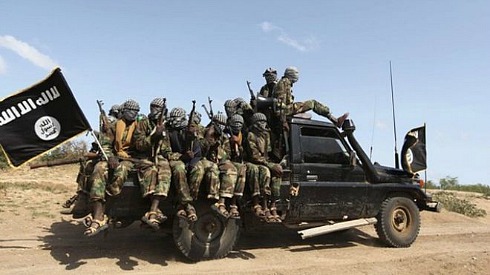Archives
September 29, 2011
Jihad, Journalists & Jackasses
The word “jihad” merely means “struggle” in Arabic, instructs a Poynter News University online course (see below).
Oh, and Nazism was merely an ideology, a body of political and economic doctrines, right?
Who could possibly fund such dangerous idiocy, if not the morally bankrupt billionaire, George Soros, whose penchant for evil ideologies precedes him? As Daniel Greenfield once wrote, Soros, a Hungarian-born Jew, “did not wear a Nazi uniform, but he might as well have, because he aided in the persecution of the Jews of Europe, without compassion, without guilt and without regret.”
Any surprise that a former Nazi collaborator is involved today in laundering another evil ideology?! Ugh.
FoxNews.com | September 29, 2011
Course Instructs Journalists to Take Note That Jihad 'Not a Leading Cause of Death'
By Judson Berger

Members of al Shabaab, al Qaeda-linked insurgents, ride in their pick-up trucks after distributing relief to famine-stricken people outside Mogadishu, Somalia, Sept. 3. (Reuters)
A new online journalism course on Islam appears to downplay the threat posed by global jihad groups, suggesting reporters keep the death toll from Islamic terrorism in "context" by comparing that toll to the number of people killed every year by malaria, HIV/AIDS and other factors.
"Jihad is not a leading cause of death in the world," the online course cautions studying journalists.
While that is technically true, researchers at the Culture and Media Institute who examined the online program took exception to that and numerous other claims made in the Poynter News University course.
Dan Gainor, vice president at the institute, said the course is sweeping these threats "under the rug," while watering down the section on jihad with inappropriate comparisons.
"Infectious disease, we have government structures to prevent that, and that's great ... in radical Islam we have not even one organization but several organizations that are constantly seeking to kill Americans and others too," he said. "It seems like journalists should not be involved in trying to downplay that."
Gainor's group released a report Thursday morning on the course. The Islam reporting program is supported in part by a group, the Social Science Research Council, which has received funding from organizations backed by billionaire George Soros.
In the section on jihad, the course informs readers that the word merely means "struggle" in Arabic -- this is something White House counterterrorism adviser John Brennan has sought to remind the public of in the past. The course notes that terrorism in the name of jihad has "failed to mobilize Muslims outside of a few territories."
But to illustrate this point, the course references the number of people killed by various causes, implicitly suggesting journalists change the way they report on jihad-related deaths.
"Of the hundreds of murders that occur each day, journalists are far more likely to report on jihad-related incidents than other violence. As a result, news consumers have developed a skewed impression of the prevalence of jihad, relative to other forms of conflict. Context is essential in covering this global story in a way that does not amplify fears of jihad," the course says.
The Poynter course estimates jihad groups have killed about 165,000 people over the past four decades, mostly in Iraq. It notes the biggest toll in the United States was the approximately 3,000 killed on Sept. 11, 2001.
"To give those numbers some context, the FBI reports that approximately 15,000 people in the U.S. are murdered each year. All around the world, more than half a million people are murdered annually, according to the World Health Organization," the course says. "At its peak, jihad organizations have accounted for less than 2 percent of this toll -- in most years, they account for well under 1 percent. (A half-million individuals die each year from nutritional deficiencies, more than 800,000 from malaria, and 2 million from HIV/AIDS.)"
Gainor noted that murder victims mostly are killed in separate incidents, whereas victims of Islamic terrorism often are killed in larger-scale attacks. Also, murder victims typically are not killed in the name of an ideological war against a country.
The online course, which is broken into several sections, also discusses "right-wing activists" bent on linking American Muslims to terrorism. The section includes the good-journalism tip that reporters should check to see if experts they're interviewing "have a bias or a stake in the story you are covering." But then it only cites examples of anti-Muslim groups.
The course also addresses Shariah law without including information of instances where the law is interpreted with harsh consequences.
"In countries governed by strict adherence to Islam, such as Iran and Saudi Arabia, Shariah is the law of the land. But in many other Muslim countries, such as Egypt, there are separate civil and Shariah law courts, with the latter governing issues such as marriage and family law, while civil courts decide the rest," the course says.
But the Culture and Media Institute, part of the conservative Media Research Center, noted that in strict countries like Iran and Saudi Arabia, people can be stoned to death or flogged for non-violent crimes. In Iran, a pastor who refused to renounce his Christian faith was facing execution after his sentence was recently upheld by an Iranian court -- though an attorney now says he is likely to be acquitted.
Representatives from the Poynter program and its supporters did not immediately respond to a request for comment.
Original article here.
Log In »
Notable Quotables
"Mr. Netanyahu is one of the most media-savvy politicians on the planet. On Friday he appeared live via video link on 'Real Time with Bill Maher,' taking the host’s alternately sardonic and serious line of questioning with gazelle-like alacrity."
~ Anthony Grant, jourrnalist who has written for many major newspapers and worked in television at Paris and Tel Aviv, interviewing former PM Benjamin Netanyahu on Monday, at the outset of Mr. Netanyahu's new book (more here).


